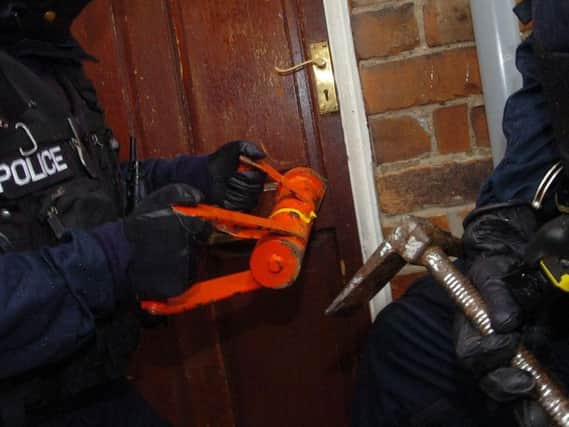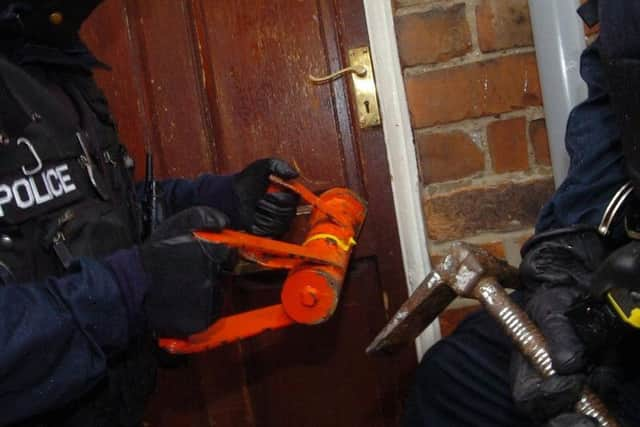Drugs seizures down by 72% across Lancashire


It comes at a time when cuts to the force are beginning to bite.
Lancashire Constabulary carried out 1,161 drug seizures in Lancashire in 2017-18 – down from 4,176 in 2009-10, when they peaked.
Advertisement
Hide AdAdvertisement
Hide AdIt means there were 779 seizures for every million people in the area, compared to an average of 2,199 across England and Wales.


A Lancashire Police spokesman said: “We are committed to tackling organised crime groups and the supply of controlled drugs in the county
“Organised crime, including the production and supply of drugs, the violence which controls this market and how it impacts on vulnerable people, blights our communities and puts ordinary law-abiding people at risk.
“I would like to reassure the public we will keep up the pressure on those involved in serious and organised crime in Lancashire, continually striving to protect the most vulnerable. We will relentlessly pursue these offenders and put them before the courts to make our streets safer.”
Advertisement
Hide AdAdvertisement
Hide AdThe most commonly confiscated drug in Lancashire is cannabis, with 6,080 plants, 8.6kg of herbal cannabis and 0.8kg of cannabis resin seized.
Amphetamines (229kg), cocaine (4.8kg) and benzodiazepines (672 doses) were also confiscated in significant quantities.
Some officers cite a reduction in the county’s neighbourhood police, who traditionally have gathered intelligence from communities about drug activity, as playing a significant part.
Steve Rothwell, vice-chairman of Lancashire’s Police federation, says a reduction in the number of seizures could be due to a combination of issues, including the cuts to the force’s budgets and in turn police officer and staff numbers.
Advertisement
Hide AdAdvertisement
Hide AdHe explains: “This has led to a reduction of community policing and therefore a lack of local intelligence coming to the police about this and other crime activities, and as we have seen in the news recently the police are also picking up the pieces of the broken NHS and mental health services, which have also had budget cuts.
“I have also discovered that the LCC has removed its out of hours emergency response and its web directs members of the public to call 101 for the police to deal with incidents.”
Conversely, one drug charity says it has not yet seen an increase in people seeking support for addictions in the wake of the fall in seizures.
Simon Rothwell, a team leader at Young Addaction Lancashire, said: “We haven’t seen an increase in numbers that would do hand in hand with police cuts.”
Advertisement
Hide AdAdvertisement
Hide AdHowever, figures show the pressures drug addiction puts on Lancashire’s other services.
Estimates from 2015 indicate there are just under 7,000 opiate or crack users aged 15 to 64 living in Lancashire, with men accounting for the majority 74 per cent.
Lancashire County Council is responsible for commissioning drug misuse services but Change Grow Live, the newly-commissioned service, was not available for comment.
Hospital admissions data over the 2012/13-2015/16 period found that there were a total of 885 hospital admissions recorded across six Lancashire clinical commissioning groups (CCGs) with a primary diagnosis of drug-related mental health and behavioural disorder.
Advertisement
Hide AdAdvertisement
Hide AdAnd 283 people died from drug poisoning in Lancashire between 2015 and 2017, according to statistics published in August, with a further 200 dying from drug misuse.
Nationally, the Police Federation has warned that officers no longer have the resources to effectively combat drugs.
The Police Federation of England and Wales said that erosion of stop and search powers were hampering the fight against drugs.
Simon Kempton, operational policing and drugs lead, said: “It is no coincidence that we have lost nearly 22,000 police officers since 2010 – it’s a simple fact that you just can’t do more with less.
Advertisement
Hide AdAdvertisement
Hide Ad“Along with a pinch on resources against a background of austerity, drugs squads have been disbanded, and those that are still operational are having to multi-task and focus on other things as well such as different organised crime gangs.
“Chief Constables have had to re-evaluate their resources and choose where to put their boots on the ground.”
A Home Office spokeswoman said: “Drugs can devastate lives, ruin families and damage communities.
“The Government is taking this seriously and is committed – through three key strategies backed by millions of pounds of funding – to tackling the illicit drug trade, protecting the most vulnerable and helping those with a drug dependency to recover and turn their lives around.
Advertisement
Hide AdAdvertisement
Hide Ad“The Home Secretary also recently announced a major review of drugs, which includes a focus on the illicit market.”
Anyone who suspects drugs being dealt in their area can contact police on 101. Alternatively, independent charity Crimestoppers can be contacted anonymously on 0800 555111 or online at crimestoppers-uk.org.
For support with drug issues you can contact Young Addaction on 0808 164 0074.